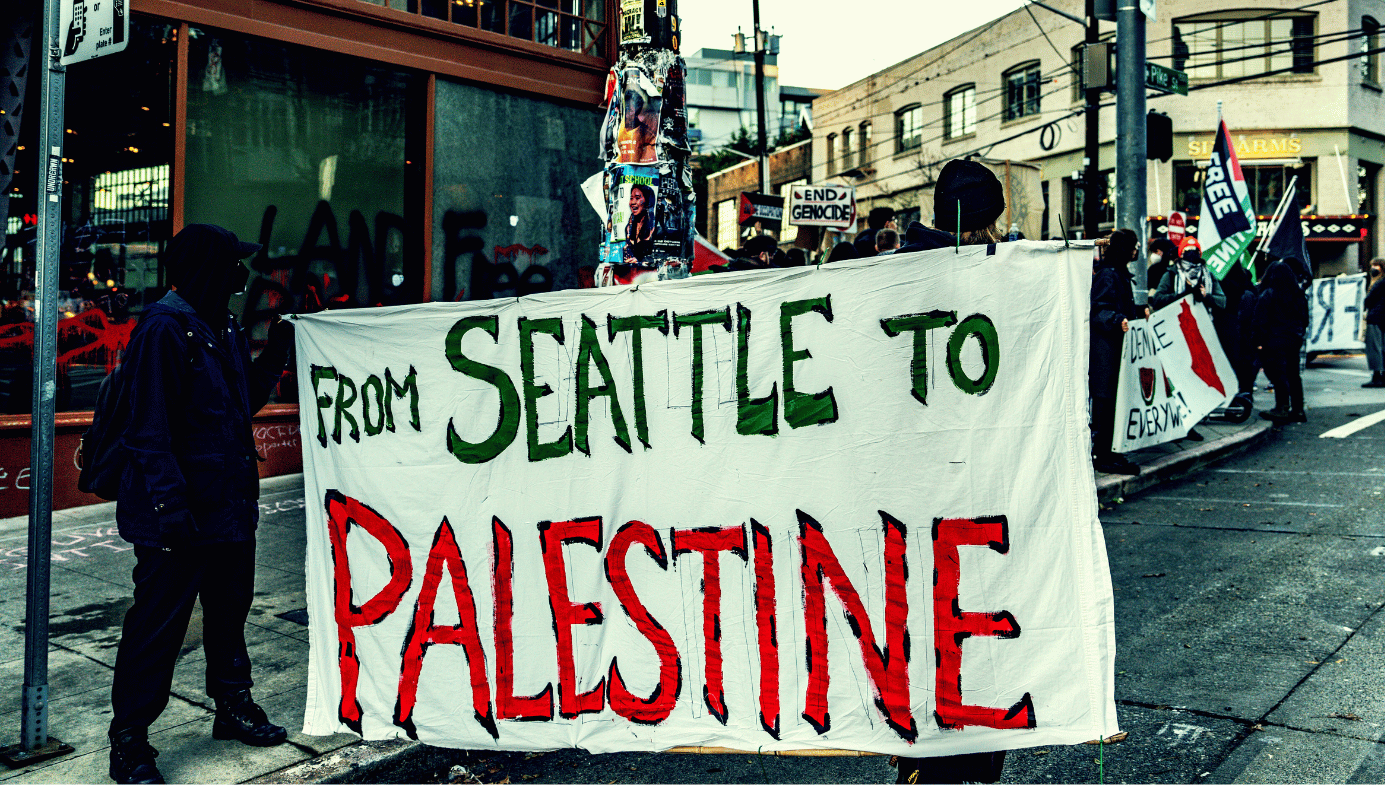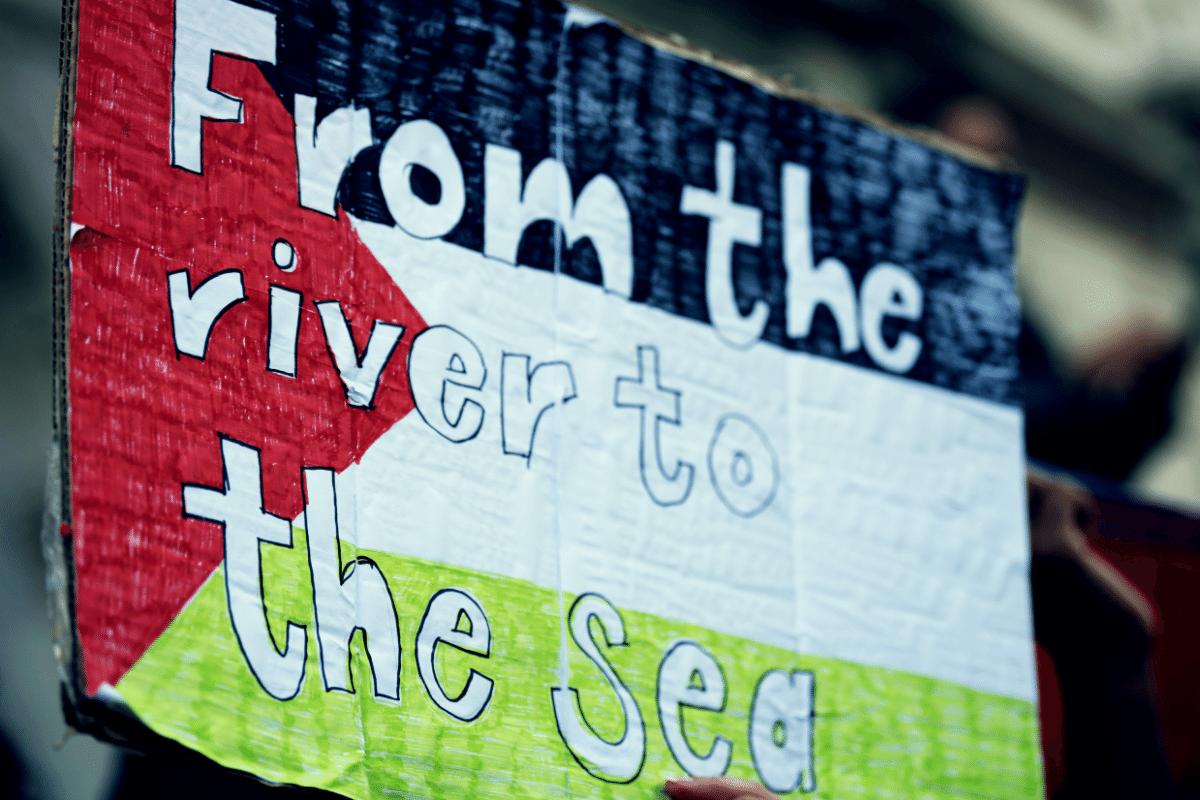Israel
Why Does the Intersectional Left Defend Hamas?
Sectarian morality arises from the concept of collective guilt.

In the wake of Hamas’s brutal attack on Israeli civilians on 7 October, many left-wing commentators have leapt to defend the terrorist group.
A Harvard CAPS/Harris poll conducted on 18–19 October found that 51 percent of respondents aged 18–24 believed that “the Hamas killing of 1200 Israeli civilians in Israel can be justified by the grievances of Palestinians.” And it’s not just students who have come out in favor of one of the world’s most savagely violent organizations. Columbia University professor Joseph Massad called the Hamas attack “awesome.” In response to the argument that killing civilians is always wrong, Yale professor Zareena Grewal tweeted, “Settlers are not civilians. This is not hard.” In London, protestors chanted, “there is only one solution: intifada revolution” and “smash the Zionist settler state,” while protestors across the West have chanted “from the river to the sea”—a slogan that often (though not always) implies a call for the death or forcible deportation of all of Israel’s 9 million Jews.
The situation in Israel-Palestine is admittedly complicated. There have been decades of conflict between Jews and Muslims and atrocities have been committed by both sides. And, of course, lots of people of good faith support Palestinians in their long struggle with Israel. But Hamas’s actions are beyond the pale. So, why are some people on the far Left supporting them?
One reason is that the people who praise Hamas are influenced by a philosophy that promotes the idea of collective guilt. In this view, Jewish civilians deserve to suffer because the Israeli Defense Force has done bad things. The victims are Jews first and individuals second; and because their primary identity is as a member of their collective group, they are blamed for the sins committed by everyone who belongs to that group. This thinking explains how 51 percent of young Americans can say that acts like raping and killing young women and beheading babies are justified: the girls and babies share an ethnicity with people who have done bad things; therefore, they had it coming.
Last night the Oakland City Council voted on a resolution to call for a ceasefire.
— Yashar Ali 🐘 (@yashar) November 28, 2023
A city council member tried to insert language condemning Hamas.
This was the reaction… pic.twitter.com/r7aTb2mkrQ
This perspective hasn’t come out of nowhere; it’s been prevalent for some time among certain academic circles. In Is Everyone Really Equal?, a textbook for graduate students of education, Robin DiAngelo (of White Fragility fame) and Ozlem Sensoy (professor of education at Simon Fraser University in Canada) explicitly promote the idea of collective identity. In Chapter 1 of their book, the authors list some statements that they disagree with. One such statement is the idea that “people should be judged by what they do, not the color of their skin.” The authors dismiss this idea as “predictable, simplistic, and misinformed.”
It’s not just DiAngelo and Sensoy; there’s an entire cottage industry on the far Left devoted to the idea of collective guilt. In their New York Times bestseller White Women, Regina Jackson and Saira Rao blame their white readers for everything from the “enslavement and genocide of African people” to “the disastrous impacts of COVID-19.” “You know what you’re doing,” they admonish their readers—even though none of their readers had even been born in 1865, when slavery was officially ended in the United States.

In Critical Theory circles, it’s common to lump people into the categories of oppressor and oppressed, based on certain immutable characteristics. The oppressors are held largely responsible for all the bad that has ever been done by anyone who shares those immutable characteristics. Thus, all men can be safely blamed for patriarchy and for denying women the right to vote until 1919; all white people can be safely blamed for slavery, etc. In the academy, these claims are usually interpreted in a way that permits some nuance; and most academics stop well short of advocating violence towards “oppressor” groups based on ethnic guilt. But ideologies mutate when they enter the mainstream and generally become more simplistic and more tribal. That’s doubly dangerous when the core of the original ideology is already simplistic and tribal.
The second factor leading some among the far Left to praise Hamas is the related idea that different groups should have different rights. For example, in response to the 7 October attacks, 37 professors at Occidental College in the US stated that we shouldn’t expect Palestinians to be “perfect victims.” The terrorist attack might not be “appropriate,” the professors argued; but must be understood in context. Meanwhile, they characterized Israel’s response as a “war crime.” When members of the “oppressed” class murder babies and rape young women, so this argument goes, their actions can be justified or at least excused. They have the right to fight back against their oppressors—even through terrorism, if necessary.
This idea goes back to the philosopher Herbert Marcuse. In a 1965 essay titled “Repressive Tolerance,” he argues that society should strip political conservatives of their right to freedom of speech because those conservatives are “serving the cause of oppression.” Marcuse recommends “withdrawal of tolerance from regressive movements before they can become active; intolerance even toward thought, opinion, and word, and finally, intolerance in the opposite direction, that is, toward the self-styled conservatives, to the political Right.” That means that people of that political persuasion shouldn’t be allowed to write, advocate, or even think about their ideas.
It’s not a huge leap from there to the idea that we should strip—or grant—other fundamental rights on the basis of immutable characteristics, such as sex and ethnicity. In an article submitted to the feminist journal Hypatia as part of the Sokal Squared hoax, James Lindsay, Helen Pluckrose, and Peter Boghossian make this leap themselves. The article was titled “The Progressive Stack: An Intersectional Feminist Approach to Pedagogy.” The authors proposed:
That educators should discriminate by identity and calculate their students’ status in terms of privilege, favor the least privileged with more time, attention and positive feedback and penalize the most privileged by declining to hear their contributions, deriding their input, intentionally speaking over them, and making them sit on the floor in chains—framed as educational opportunities we termed “experiential reparations.”
The journal’s peer reviewers praised the piece but asked the authors to “revise and resubmit” to incorporate some changes. None of those suggested edits, however, concerned the proposal to place certain students in chains on the basis of their ethnicity.
In this academic zeitgeist, should we be surprised when some students and professors praise or attempt to justify Hamas’s attack? Members of “oppressed” groups, in this line of thinking, should have more rights than members of “oppressor” groups. Those rights may even include the murder of civilians.
The response to the atrocities committed by Hamas should be a wake-up call. It demonstrates the perils of an ideology that prioritizes group over individual identity, assigns collective guilt, and doles out human rights on the basis of nationality, religion, or skin color. It shows us just how brutal such an ideology can be.

There is an alternative: the Enlightenment philosophy of individualism. This philosophy holds that all humans have equal rights and intrinsic worth. It is epitomized by Thomas Jefferson’s statement in the 1776 Declaration of Independence that “all men are created equal, that they are endowed by their Creator with certain unalienable Rights, that among these are Life, Liberty, and the pursuit of Happiness.”
This philosophy argues that the individual is the fundamental unit of society. Any sins that I commit can only be laid at my own feet, not at the feet of others. This demolishes the idea of collective guilt and collective punishment. As a natural corollary, it also demolishes the idea that some people should be free to kill others merely for belonging to a certain ethnic group. Or as John Locke puts it in his Second Treatise of Government (1690), “being all equal and independent, no one ought to harm another in his life, health, liberty, or possessions.”
This philosophy condemns violence against innocents no matter who the perpetrator is and does not endorse the rape and murder of young women and girls. It allows us to weep at unjust wars, to seek peaceful solutions to intractable conflicts, and even to label some governments “colonizers” (like the British in the 18th century). But it does not say that some people have the right to engage in terrorist activity because their ethnic group has been mistreated.
This philosophy also dovetails with just war theory, which is concerned with when war is justified and how a just war should be conducted. Modern just war theory recognizes that countries have a right to defend themselves, much as an individual has the right to punch someone who has punched or is threatening to punch them. According to this theory, Israel certainly has the right to attack and try to cripple Hamas—especially since the eradication of Israel is one of Hamas’s core goals, as their founding charter explicitly states. At the same time, just war theory draws on the philosophy of individualism to condemn the deaths of civilians on all sides and regards the slaughter of Palestinian civilians as every bit as bad as the slaughter of Israelis. While just war theory recognizes that some civilian casualties are unavoidable—and that is especially the case in this conflict, since Hamas uses civilians as human shields—it also exhorts governments to do everything in their power to protect innocent life. This philosophy is not partisan, and thus promises to hold both Israel and Hamas to the same high moral standard.
Enlightenment individualism is the bedrock of universal human rights and just war theory. It is even more than that: it is the moral foundation of the modern West. We should return to it before it’s too late.






